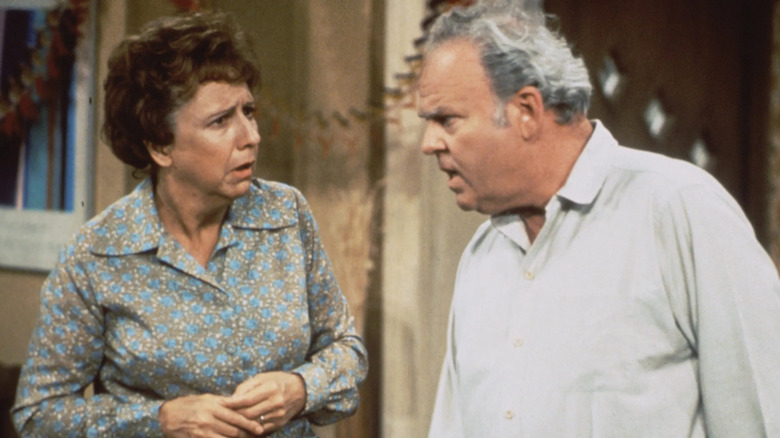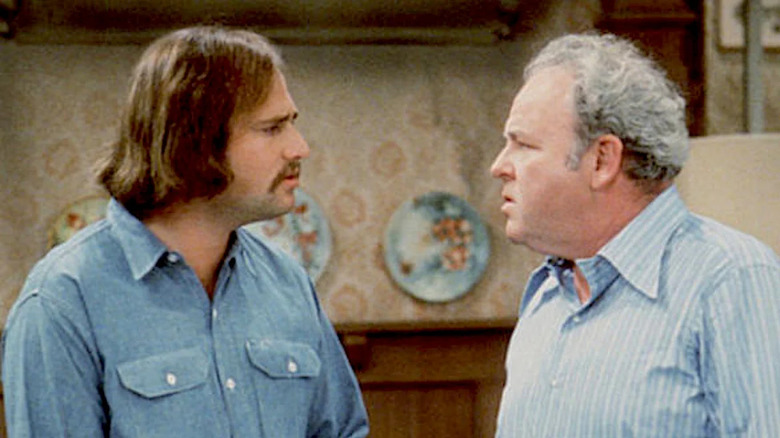Norman Lear's All In The Family Was Met With A Lot Of Doubt And Warning At The Start
With the passing of Norman Lear at the age of 101, we bid a fond farewell to one of the most important figures in the history of not just sitcoms, but television as a medium. TV shows that dared to address real-world problems were not unheard of when Lear came to fame by creating "All in the Family" in 1971 ("The Twilight Zone" had already existed for over a decade). However, they were very much the exceptions to the rule. Sitcoms, in particular, were overwhelmingly white, heterosexual, and conservative in their outlook, steering clear of any topic that could be considered even remotely controversial or polarizing.
Lear, of course, recognized this facade for what it was. In his autobiography "Even This I Get to Experience," the multi-hyphenate rightly dismisses the idea that his first big hit sitcom was any more "political" than other shows airing at the time. In his own words:
"For 20 years — until ['All in the Family'] came along — TV comedy was telling us there was no hunger in America, we had no racial discrimination, there was no unemployment or inflation, no war, no drugs [...] Tell me that expressed no point of view!"
"All in the Family" was itself based on "Till Death Us Do Part," a British sitcom that, like its U.S. counterpart, centered on a working-class white guy who proudly wore his bigotry on his sleeve and clashed with his liberal daughter and son-in-law (much to the concern of his adoring wife). Carroll O'Connor would ultimately make the role of the show's prejudiced patriarch, Archie Bunker, his own, but he was not the first choice for the role. In fact, Lear had initially lined up a much bigger name who shot him down flat and warned him the entire undertaking was doomed.
'Norm, they're going to kill you'
It's impossible these days to picture anyone but O'Connor kvetching about the state of the world as Archie Bunker, but originally Lear had his eye on casting Mickey Rooney for the part. (One assumes the "Breakfast at Tiffany's" actor didn't fully grasp why Lear might have readily thought of him to play an obliviously prejudiced blue-collar stiff.) As Lear recalls in "Even This I Get to Experience," Rooney responded to his offer accordingly:
"Norm, they're going to kill you, shoot you dead in the streets. You want to do a TV show with the Mick, listen to this: Vietnam vet. Private eye. Short. Blind. Large dog."
Lear got the last laugh there, though it was far from a walk through the park for him. As he recounts in his autobiography, he was still clashing with CBS's censors over material in the show's pilot as little as 20 minutes before "All in the Family" premiered on January 12, 1971, and only managed to win the fight by threatening to quit. He would have to repeat that trick again and again over the years as the show went on, all the while butting heads with the "murderously difficult" O'Connor, as Lear calls him in the book.
Thankfully, all his suffering was not in vain. Across nine seasons, "All in the Family" tackled subjects like racism, marital infidelity, abortion, and much more with unflinching honesty. It wasn't gradual, either; the show even went so far as to introduce the first-ever openly gay sitcom character during its fifth episode. Despite the outcry from real-life Archie Bunkers who bemoaned "Those were the days" alongside the character during the opening credits song, the show was a smash hit that helped open the floodgates to a better, more progressive television landscape.

